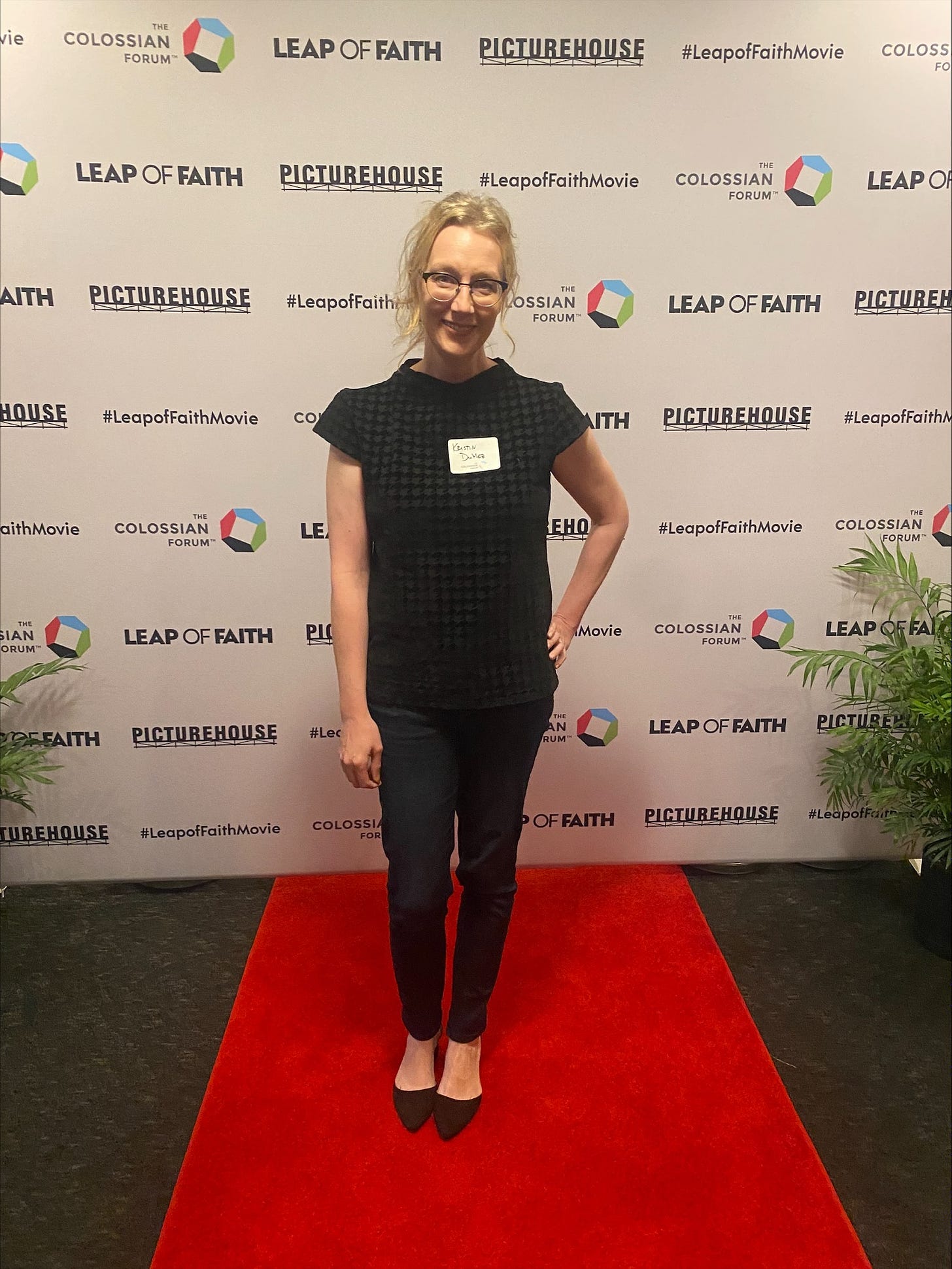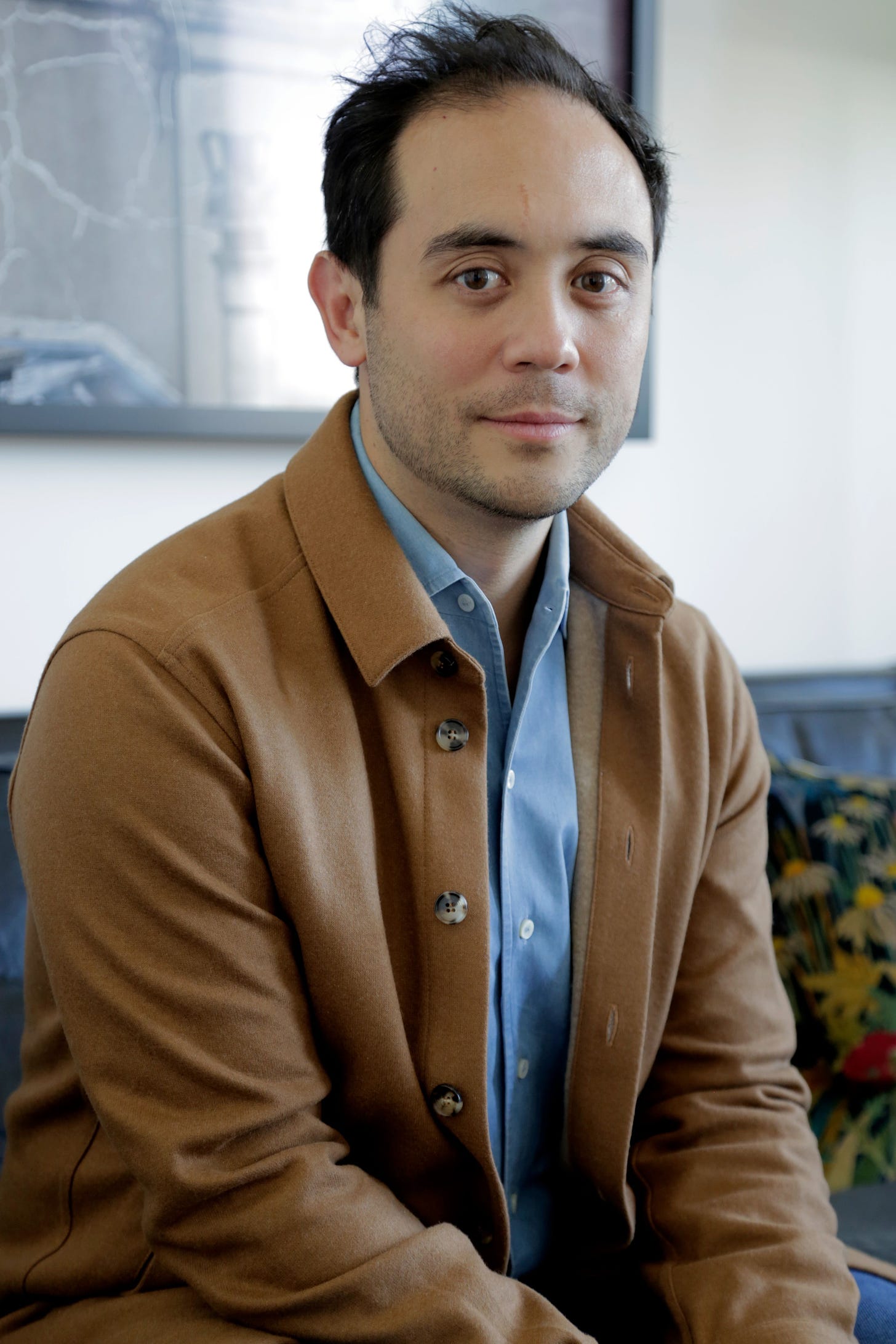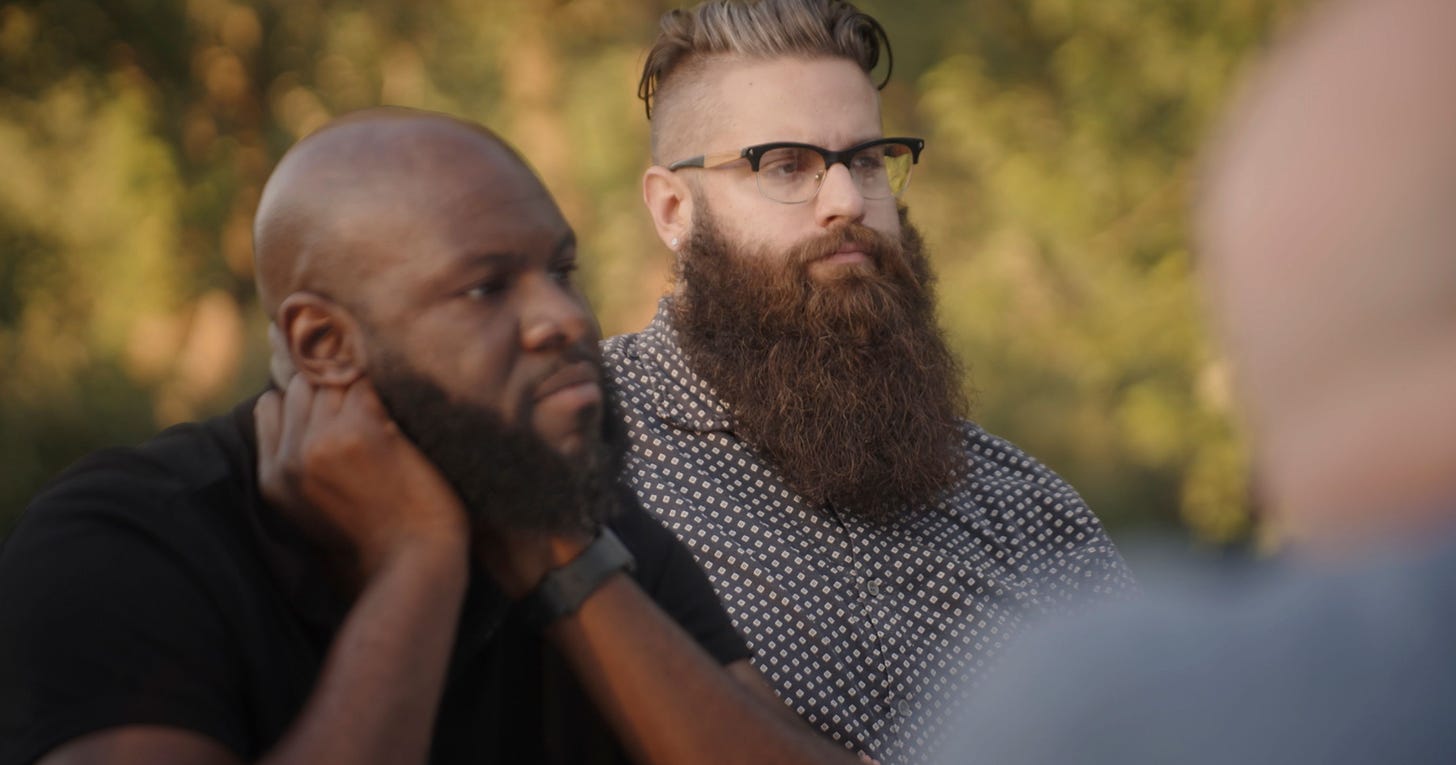It’s been a hectic few days launching For Our Daughters into the world, and on Monday afternoon, I was exhausted. After a day full of back-to-back interviews, I looked at my calendar to see if I was done for the day, only to discover I had an evening event I’d committed to attending: a screening of the new documentary Leap of Faith. I thought about bowing out. I really needed to spend a few hours not talking to anyone. But my friend from the Colossian Forum had invited me, and she’d also given me the heads-up that Yo-Yo Ma was going to be giving a brief performance at the screening. How could I say no?
I looked at the clock. Ten minutes before I needed to leave. My hair was a mess, I was wearing flip-flops, and I still had a dozen urgent emails to answer. Choices needed to be made. I answered the emails, slipped on fancier shoes, and raced out the door. No one would notice my hair, I told myself.
Arriving at the theater, I grabbed my name tag and turned the corner only to be confronted by an actual red carpet. Did I want my picture taken? I definitely didn’t have a red carpet worthy look, but how could I say no?
The event began with drinks and appetizers, and as I moved through the room I saw many familiar faces. I met friends, and friends of friends, and then we were told to grab another drink before heading into the theater. (A perk of a special screening—thank you Celebration North!) We were then greated by a delightful children’s choir and by Yo-Yo Ma (who happens to be the director’s dad). Ma played a couple simple, gorgeous songs, and one with exquisite harmonies. Thinking that would be the highlight of the evening, I settled into my recliner with a box of popcorn to watch the film.
I was caught off guard. The film was beautiful. I knew the work of the Colossian Forum and their efforts to bring Christians together across difference. I’d participated in conversations moderated by them before, and I knew they led with a lovely vision. I’d wondered, however, how the time-intensive effort could be scaled up. And I worried sometimes that their approach might occasionally reinforce a “both-sides” mindset at a time when circumstances may call for something else.
As I watched the film unfold, I saw that it—and the work of the Colossian Forum—was after something deeper. Director Nicholas Ma approached his subject with kindness, keen understanding, and a gentle touch, allowing viewers, like the film’s participants, to peel back hardened layers deposited by too many years of culture warrioring.
I’ll avoid spoilers, but the film, following the lead of the group itself, ended up coming back to one of the issues most dividing Christians—the question of sexuality. Here, the conversations are heavy, sometimes painful, and very real. The end doesn’t land where viewers coming from different ends of the spectrum may want it to land, but it might be where viewers—especially those from different ends of the spectrum—need it to land.
It’s hard to sum up the impact of the film in ways that don’t sound trite, not because the film itself is trite—it is not—but because it’s hard to capture the richly textured film in a sentence or two. In a fractured moment, Leap of Faith reminds us that none of us can be reduced to our stances on any political or theological issue. It reminds us of the harm we do to others, even when we don’t intend to. It shows us that love and belonging need not—cannot—be measured out only within our own ideological tribes.
Sitting in the theater, I found myself thinking of something that’s occurred to me occasionally over the past couple of years: What would it look like if American Christians took the prayer of Jesus in John 17 seriously. I remember still when I first stumbled across that passage in my own devotional reading. I don’t remember how old I was, but I was stunned to find those words in the Bible. Here we had Jesus himself praying directly for us—for me. What was his prayer for us? “That all of them may be one, Father, just as you are in me and I am in you. May they also be in us so that the world may believe that you have sent me.” He prayed for those of us who followed to be brought “to complete unity.”
I think of these words often in light of the fact that Christians can be some of the most polarizing members of our society, and when Christians set their sights on their non-Christian neighbors and also on fellow Christians who don’t adhere to their political or ideological agenda. There is certainly a space for hashing out political, economic, and social disagreements, and doing so as people of faith, but the extent to which so many self-professed “Bible-believing Christians” gloss over this direct request of Jesus is startling.
Rather than a “Gospel Coalition” that excludes huge swaths of the church based on patriarchal preference, what Christians could use today is a “John 17 Coalition”—a commitment to striving for unity across difference. This isn’t about finding the center between opposing views and inhabiting some “messy middle.” It’s about finding the center beneath our views in a way that shapes not only what we pursue but how we pursue it, how we engage those who differ from us, how we find belonging and invite others to belong, how we live our lives in community, loving our neighbors. (Not coincidentlly, Ma directed the award winning documentary on Mr. Rogers, Won’t You Be My Neighbor?) My sense is that this posture would quickly translate to a more loving and just engagement with those outside of the Christian fold, too. In an age of fracture, Christians could initiate a movement to defuse the polarizing trends that threaten to tear apart our churches and our society, rather than adding fuel to the fire.
I’m not naive. I know many Christians have no desire to pursue unity with fellow Christians across political or theological difference. For Christian leaders intent upon consolidating their own power by stoking and weaponizing feelings of alienation and fear, unity would undercut their entire project. But I think we should at least demand to know from such leaders why they are enacting a plan that runs directly counter to that which Jesus set out for them.
These were the thoughts swirling in my mind after viewing Leap of Faith. Even as I write this, I’m aware that it doesn’t make a lot of sense for me to take time I don’t have during the week I’m supposed to be promoting my own film to instead promote a film I only just heard of. But I would love for Leap of Faith to be viewed widely by American Christians.
The film opens this weekend in select cities. If you’re in Boston, Dallas, Houston, Nashville, New York, Phoenix, St. Louis, or Washington, D.C., please go. Invite your friends! There are other cities, too—you can find them all here, and check back each week for updates.
There are also free screenings at select cinemas including Nashville, Phoenix and Washington DC — anyone interested in accessing tickets (and/or bringing a group) should contact sofia@ernestlyford.com to RSVP.
If you are in Grand Rapids, you can see the film at Celebration Cinema Friday October 4 through Thursday, October 10. There are also free tickets available for screenings that include conversations with the pastors afterward. Registration is required and you can feel free to pass along these links to your friends and family:
· Saturday, October 5 at 7:00 pm at Celebration Cinema South, featuring Chase Stancle and Troy Hatfield
· Sunday, October 6 at 4:00 pm at Celebration Cinema North, with Ben Kampmeier, Troy Hatfield, Kim DeLong, and Tierra Marshall
· Sunday, October 6 at 4:00 pm at Celebration Cinema Rivertown, featuring Andrew Vanover and Ashlee Eiland
If we can fill theaters this weekend, it means many more theaters will be screening the film around the country. And if this film succeeds, that means we’ll be seeing more like it, which is essential when so much that is produced for Christian (and wider) audiences pulls us in the opposite direction. So please help spread the word!








You being you... and none of us care about 'the hair' as much as you did. So deeply thankful for your voice in the chaos of our nation. (I get tears just typing this... because people like you, & you're at the top, have kept my belief in a possibe living God alive) AND the film is fantastic... and sad.
I will look forward to seeing the film this weekend in Nashville. But as a lifelong Methodist/United Methodist—I was 11 years old when the UMC was formed through a merger with the Evangelical United Brethren, and my minister dad actually took me to the 1968 ceremony at General Conference in Dallas where the union was ratified—I'm not quite sure how to feel about a call for unity right now.
I'm a heterosexual male, and my wife and I have been married for 43 years. But by the time I started college, I had concluded that homosexuality was inborn and, therefore, could not, in and of itself, be a sin in the eyes of a Creator who made some people that way. I also observed the misery with which closeted LGBTQ people, including one of my cousins, were forced to live because they could not publicly claim, much less celebrate, their true identity. Surely, I thought, a loving God did not intend for people to suffer because they were born with a certain orientation. Surely, monogamous same-sex relationships "do no wrong to a neighbor," which was Paul's formula for the fulfillment of the Law.
But for years I was willing, for the sake of maintaining unity, to go along with the often painful compromise that the UMC had made: LGBTQ people were welcome, but LGBTQ pastors were not, and same-sex marriages could not be performed by a UMC pastor or in a UM church.
Nevertheless, even though the recent UMC General Conferences were willing to embrace compromises that allowed congregations or jurisdictions to maintain prohibitions against same-sex pastors and marriages, thousands of congregations walked away — not in protest to changes enacted but over the mere prospect of change.
I think a lot of urban United Methodist pastors will tell you, as mine told me, that the split is not even primarily about sexuality. Just as much if not more, it's about a rural-urban divide and a general feeling among the leavers that "blue" cities are full of liberals who oppose the Christian Nationalism that is the dominant religion in the small towns and rural communities where I grew up.
I was willing to remain at the table with these people. I did not walk away. They did.
When I returned home to Texas last year for my mother's funeral, it was jarring and sad to walk into my parents' old church—a place I had worshipped many times—and realize that we were no longer part of the same denomination. The hymns we sang were no longer from the United Methodist Hymnal. Ninety-five percent of that congregation had voted to leave. It drove home the message to me that I was welcome there only so long as I remained "closeted" about my views—not just on human sexuality but on issues such as the Jewishness of Jesus or my belief that Christian Nationalism is diametrically opposed to the Christianity of the Gospels and Paul. They regard my views as heretical, so in their presence, I kept those views in the closet and focused on what we had in common.
But now that they have broken fellowship, I'm not enthused about preaching unity to people who walked away. Maybe they're the ones who should be reaching out to people like me. I feel like I was part of an abusive relationship, spiritually, and I'm not eager to move back in with people who think I'm going to hell.